
George Raft was an American film actor and dancer identified with portrayals of gangsters in crime melodramas of the 1930s and 1940s. A stylish leading man in dozens of movies, Raft is remembered for his gangster roles in Quick Millions (1931) with Spencer Tracy, Scarface (1932) with Paul Muni, Each Dawn I Die (1939) with James Cagney, Invisible Stripes (1939) with Humphrey Bogart, and Billy Wilder's comedy Some Like It Hot (1959) with Marilyn Monroe and Jack Lemmon; and as a dancer in Bolero (1934) with Carole Lombard and a truck driver in They Drive by Night (1940) with Ann Sheridan, Ida Lupino and Bogart.

Daughter of the Dragon is a 1931 American pre-Code crime mystery film directed by Lloyd Corrigan, released by Paramount Pictures, and starring Anna May Wong as Princess Ling Moy, Sessue Hayakawa as Ah Kee, and Warner Oland as Dr. Fu Manchu. The film was made to capitalize on Sax Rohmer's then current book, Daughter of Fu Manchu, which Paramount did not own the rights to adapt. Despite being the starring lead and having top billing in this film, Wong was paid only $6,000, half the money for her role that Oland was paid for his, even though Oland had less screen time than Wong. In a 2020 article about Wong, O, The Oprah Magazine linked this discrepancy to racism.

The Bowery is a 1933 American pre-Code historical comedy-drama film set in the Lower East Side of Manhattan around the start of the 20th century directed by Raoul Walsh and starring Wallace Beery and George Raft. The supporting cast features Jackie Cooper, Fay Wray, and Pert Kelton.

Bolero is a 1934 American pre-Code musical drama film directed by Wesley Ruggles and starring George Raft and Carole Lombard. The Paramount production was a rare chance for Raft to play a dancer, which had been his profession in New York City, rather than portraying a gangster. The film takes its title from the Maurice Ravel composition Boléro (1928). The supporting cast includes William Frawley, Ray Milland and Sally Rand.

Belle of the Nineties is a 1934 American Western film directed by Leo McCarey and released by Paramount Pictures. Mae West's fourth motion picture, it was based on her original story It Ain't No Sin, which was also to be the film's title until censors objected. Johnny Mack Brown, Duke Ellington, and Katherine DeMille are also in the cast. The film is noted for being the premiere performance of the jazz standard "My Old Flame", performed by West with the Duke Ellington Orchestra.

Montagu Love was an English screen, stage and vaudeville actor.

The Painted Veil is a 1934 American drama directed by Richard Boleslawski and starring Greta Garbo. The film was produced by Hunt Stromberg for Metro-Goldwyn-Mayer. Based on the 1925 novel The Painted Veil by W. Somerset Maugham, with a screenplay by John Meehan, Salka Viertel, and Edith Fitzgerald, the film is about a woman who accompanies her new husband to China while he conducts medical research. Feeling neglected by her husband, the woman soon falls in love with a handsome diplomatic attaché. The film score was by Herbert Stothart, the cinematography by William H. Daniels, the art direction by Cedric Gibbons, and the costume design by Adrian. The film earned $1,658,000 at the box office.

Taxi! is a 1932 American pre-Code film directed by Roy Del Ruth and starring James Cagney and Loretta Young.

The Scarlet Pimpernel is a 1934 British adventure film directed by Harold Young and starring Leslie Howard, Merle Oberon, and Raymond Massey. Based on the 1905 play by Baroness Orczy and Montagu Barstow and the classic 1905 adventure novel by Orczy, the film is about an eighteenth-century English aristocrat (Howard) who leads a double life, passing himself off as an effete aristocrat while engaged in a secret effort to rescue French nobles from Robespierre's Reign of Terror. The film was produced by Alexander Korda. Howard's portrayal of the title character is often considered the definitive portrayal of the role. In 1941, he played a similar role in "'Pimpernel' Smith" but this time set in pre-WWII Germany.

Peter Ibbetson is a 1935 American black-and-white drama/fantasy film directed by Henry Hathaway and starring Gary Cooper and Ann Harding. The film is loosely based on the 1891 novel of the same name by George du Maurier. A tale of a love that transcends all obstacles, it relates the story of two youngsters who are separated in childhood and then drawn together by destiny years later. Even though they are separated in real life because Peter is unjustly convicted of murder, they discover they can dream themselves into each other's consciousness while asleep. In this way, they live out their lives together. The transitions between reality and fantasy are captured by the cinematography of Charles Lang, as discussed in the documentary Visions of Light (1992).

Alexander Hall was an American film director, film editor and theatre actor.
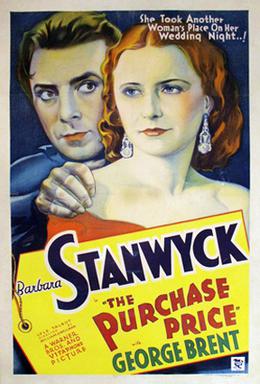
The Purchase Price is a 1932 pre-Code American romantic drama film directed by William Wellman and starring Barbara Stanwyck, George Brent and Lyle Talbot. Adapted from the novel The Mud Lark by Arthur Stringer, with a screenplay by Robert Lord, the film is about an attractive nightclub singer who leaves her criminal boyfriend and becomes the mail-order bride of a humble farmer.
Tiger Bay is a 1934 low-budget British film directed by J. Elder Wills and starring Chinese-American actress Anna May Wong.
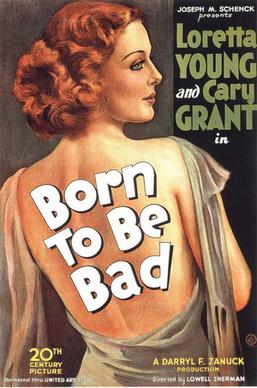
Born to Be Bad is a 1934 American pre-Code drama film starring Loretta Young and Cary Grant, and directed by Lowell Sherman.
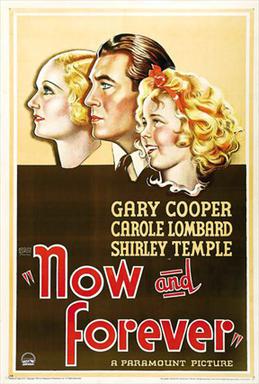
Now and Forever is a 1934 American drama film directed by Henry Hathaway. The screenplay by Vincent Lawrence and Sylvia Thalberg was based on the story "Honor Bright" by Jack Kirkland and Melville Baker. The film stars Gary Cooper, Carole Lombard, and Shirley Temple in a story about a small-time swindler going straight for his child's sake. Temple sang "The World Owes Me a Living". The film was critically well received. Temple adored Cooper, who nicknamed her 'Wigglebritches'. This is the only film in which Lombard and Temple appeared together.

Gentlemen Are Born is a 1934 American drama film directed by Alfred E. Green and starring Franchot Tone, Jean Muir and Margaret Lindsay. The film's pre-release title was Just Out of College. A news item in Daily Variety notes that Warner Bros. was sued for $250,000 by Ronald Wagoner and James F. Wickizer who contended that the film was based on their story "Yesterday's Heroes."
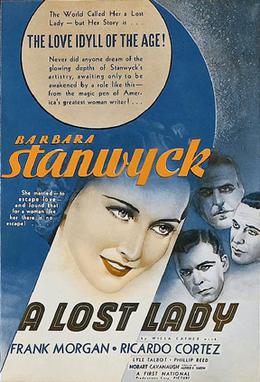
A Lost Lady is a 1934 American drama film directed by Alfred E. Green and starring Barbara Stanwyck, Frank Morgan and Ricardo Cortez. It is based on the 1923 novel A Lost Lady by Willa Cather, with a screenplay by Gene Markey and Kathryn Scola. Warner Bros. had produced a 1924 silent film based on the story, starring Irene Rich.

Cafe Metropole is a 1937 American romantic comedy film directed by Edward H. Griffith and starring Loretta Young, Tyrone Power and Adolphe Menjou. It was produced and distributed by 20th Century Fox. The screenplay was based on an original story by Gregory Ratoff who also appears in the film. It is part of the tradition of screwball comedies which was at their height during the decade. It was commercially successful on its release.

The Night Is Young is a 1935 American romantic musical film starring Ramon Novarro and Evelyn Laye. The film is based on a story written by Vicki Baum and directed by Dudley Murphy.
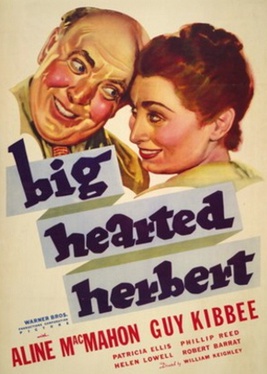
Big Hearted Herbert is a 1934 domestic comedy film starring Aline MacMahon and Guy Kibbee as a middle-aged couple. It is based on the Broadway play of the same name by Sophie Kerr and Anna Steese Richardson, which was in turn based on the short story "Chin-Chin" by Kerr. It was remade in 1940 as Father Is a Prince.



















